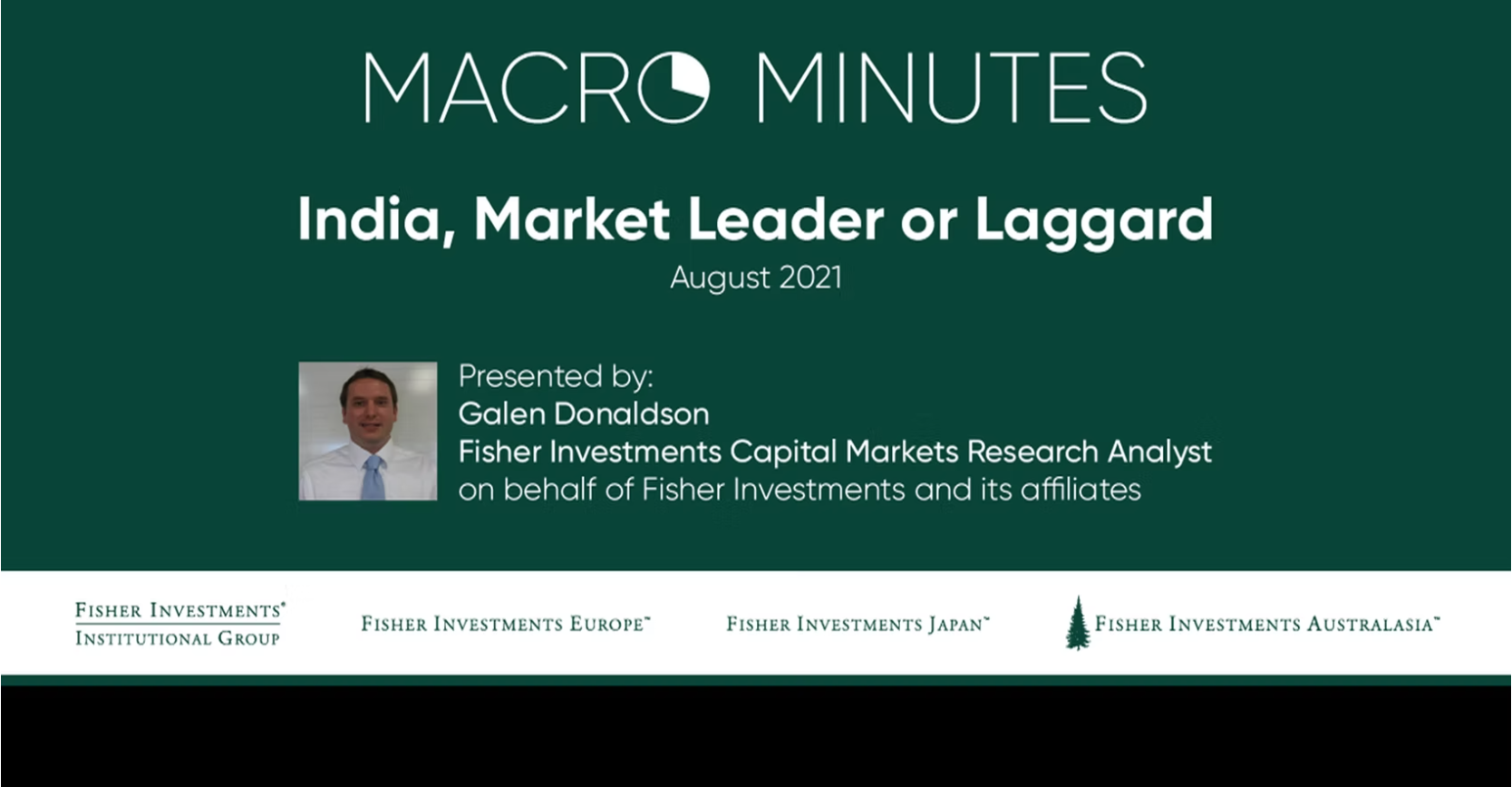Institutional Investing / Macro Minutes
Macro Minutes: India Market Leader or Laggard

In our latest Macro Minutes video, Capital Markets Research Analyst Galen Donaldson covers our top-down views of India.
View Transcript
|
Visual |
Audio |
|---|---|
|
Title screen appears "India, Market Leader or Laggard” Underneath the title is the picture of the presenter Galen Donaldson, Fisher Investments Capital Markets Research Analyst on behalf of Fisher Investments and its affiliates. On the bottom right of the screen is a live Galen Donaldson speaking to us from his office. |
Galen Donaldson: Hi. My name is Galen Donaldson, and I'm a Capital Markets Research Analyst. Today I'll be covering some of our views on India. We'll talk about India's economy, the impacts from COVID and India's policy response, the influence of politics and reform on Indian equities, and the key investment implications. |
|
On the screen, Galen Donaldson is showing 2 charts under the title "INDIA'S ECONOMIC GROWTH WAS SLOWING BEFORE COVID". The first chart is about India's GDP while the other is about India’s loan Growth. |
Galen Donaldson: One of our firm's key forward looking views about the impact of COVID not only for India but globally, is we're likely to see a temporary economic bounce before growth resumes to resembling the pre COVID conditions, and a lot of the economic bounce is likely behind us. When we apply that idea to India, we find the pre COVID growth trend was slowing. GDP growth peaked at 9% in early 2018 and slowed to about 3% prior to COVID. Meanwhile, loan growth peaked at about 15% in late 2018, before slowing to about 6%. One of the reasons loan growths slowed is due to asset quality concerns of banks, which are not helped by policies to help borrowers shrink COVID, such as moratoriums on loan repayments. We don't expect asset quality concerns to pose a systemic risk, particularly for the higher quality banks, but it's a difficult lending environment which likely poses a headwind to strong economic growth ahead, or at least to a growth environment that bucks a trend and is positively differentiated. Versus EM Peers. |
|
On the screen, Galen Donaldson is showing a table titled "INDIA'S DEFICIT HISTORY" about India’s deficit history in response to Covid. |
Galen Donaldson: Speaking of India's COVID policy response, like many countries around the globe, India implemented supportive monetary and fiscal policy measures to offset the impact of COVID and support economic growth. Earlier this year, India announced a budget with a significantly higher deficit than expected. Stepping back, another of our key views is stimulus is unlikely to be as stimulative as hoped. Historically, fiscal stimulus programs haven't increased near term growth all that much. And when you look at India's deficit history, India tends to do better on a relative basis versus EM when it's shrinking its deficit. When India expands its deficit, the performance history is mixed. India tends to underperform EM on average, with a slightly better than coin flip frequency of outperformance. This phenomenon is likely explained by India's dual deficit, which makes the country more vulnerable to external shocks. So, investors prefer when India is improving its fiscal position and tend to be more nervous when it trends the other direction. There are a couple of offsetting factors. First, like many EM countries, India has directionally improved its position over the last five to ten years. And second, one small positive to emerge from COVID was an improved current account that was mostly from falling imports and temporary. |
|
On the screen, Galen Donaldson is showing a chart/timeline titled "LOW POTENTIAL FOR REFORM DRIVEN OPTIMISM" explaining the low potential for reform driven optimism. And recent actions against foreign firms. |
Galen Donaldson: One driver that can lead to Indian outperformance is reform. India has a history of periods of reform optimism that can last for several years. For example, the election of Modi to his first term in 2014 had honeymoon effect for Indian equity markets and India outperformed for about three years before Modi. There had been hopes of reforms for some time, but previous Prime Minister Singh had been in office for nearly a decade, with little done under Modi optimism built for reforms such as a nationwide goods and services tax and implementation of bankruptcy Code, which led to a multiyear period of outperformance. The honeymoon effect is followed by a period where reforms are often watered down and clawed back during implementation, which tends to be much harder. And that's an environment where India didn't do as well. We're monitoring the globe for countries where we see the potential for a sustained period of reform, optimism to build, and for India, the likelihood of another honeymoon phase building today is low. They tend to happen around elections, which is when political capital is at its highest. Recent reform announcements have been modest in nature, or even modest clawback. Some modest reforms include lowering the corporate tax, labour reform, reducing government supervision, and in banking, we've seen some discussion of privatization and selling stakes in a couple of state-run banks. Modest clawback includes India's approach to foreign direct investment. As an example, in 2015, India did a big liberalization of foreign direct investment regulations, which continued to build through mid 2016. Since then, the trend has mostly been reversing, and India has increasingly taken action against firms from the US. And China. This includes ecommerce legislation in 2018 on US. Investments in ecommerce, increased foreign direct investment restrictions on China, and banning many mobile apps from China, and banning new card issuance in the payment space. |
|
On the screen, Galen Donaldson is showing 2 charts under the title "INDIA TENDS TO HAVE A VALUE AND DEFENSIVE TILT". The first chart is of India’s relative returns and EM style, and the other chart is value and defensive tilt. |
Galen Donaldson: Turning to investment implications, India tends to have a value and defensive tilt, due to the types of companies found in its index. In relative exposure terms versus EM, India has more financials, energy, and materials, which tend to be more value oriented, and more consumer staples, utilities and healthcare, which tends to be defensive and explains India's value and defensive tilt over time. India's relationships with these style factors aren't quite as strong as some places like Brazil's with value, and there are periods with deviations. For example, in the middle to back half of2020, India traded like tech, when every country with a lot of technology acted like growth. India has a large tech sector just under 18% in absolute weight terms. Now, keep in mind, India's tech and tech like sector skews towards relatively slower growing It services. India doesn't have as much of the higher growth Internet and ecommerce and tech firms found elsewhere in Asia. And since the November 2020 vaccine efficacy announcement, India has acted like value, which we expect to continue, given our outlook for a late cycle bull market led by growth. This supports an underweight positioning. However, India is the fourth largest weight in EM, at just under 11%. So we want to have some exposure to the country, consistent with our outlook for high quality growth categories like technology to lead. We have the bulk of our exposure in It services, where demand largely comes from the developed world, and we also own a small amount of high-quality banking exposure as a value hedge and to give us some exposure to India's domestic economic growth. |
|
On the screen, a white background appears with black written text that read as “thank you for watching! If you would like to learn more about our view, please reach out to your relationship manager or email FisherInstitutional@fi.com. A series of disclosures appears on the screen. |
Galen Donaldson: Thank you for watching. If you'd like to learn more about our views, please reach out to your relationship manager. [music] |
|
Investing in Financial Markets Involves The Risk of Loss and There is no Guarantee that all or any capital invested will be repaid. past performance neither guarantees nor reliably indicates future performance, the value of investments and the income from them will fluctuate with world financial markets and international currency exchange rates. The information in this document constitute the general views of Fisher Investments and its affiliates and should not be regarded as personalized investment advice or a reflection of the performance of fisher Investment or its clients. we provide our general comments to you based on information we believe to be reliable. there can be no assurances that we will continue to hold this view; and we may change our views at any time based on new information, analysis or Reconsideration. some of the information we have produced for you may have ben obtained from a third party source that is not affiliated with Fisher Investment. Fisher Investment requests that this information be used for your confidential and professional use. Data is month end and USD unless Stated otherwise. Fisher InvestmentFisher Asset Management, LLC, Doing Business as Fisher Investment (FI) is an Investment adviser Registered with the US Securities and Exchange Commission. As of February 28, 2022, Fi Managed Over $192 Billion, Including assets sub-Managed for its Wholly-owned Subsidiaries. Fisher Investments IrelandFisher Investments Ireland Limited (FII), an Irish private Limited Company, is Registered, along with its trading name, Fisher Investment Europe, With the Companies Registration office in Ireland (#623847 and #629724), and is regulated by the Central Bank of Ireland, with its registered address at: 2nd Floor, 3 George’s Dock, International Financial Services Centre, Dublin 1, D01 X5X0, Ireland. FII is Wholly-owned by Fisher asset Management, LLC, trading as Fisher Investment (FI), Which is Wholly-owned by Fisher Investment, Inc. FII outsources Portfolio Management to FI, FI’s Investment Policy Committee is responsible for all strategic investment Decisions. The Fisher Joint Investment oversight Committee is Responsible for overseeing FI’s Management of portfolios that have been outsourced to FI. This Material may also be found posted on the FII website at Institutional.fisherinvestments.com/en-ie. if you firm wishes to be removed from receiving these Materials in the future or wishes to pay for this material. please contact FII. This material has been approved and is being communicated by FII. Fisher Investment UKFisher Investments Europe Limited (FIUK) is authorized and regulated by the Financial Conduct Authority (FCA #191609), Trades Under the name Fisher Investments Europe, and is registered in England (Company #385093). FIUK is Wholly-owned by Fisher Asset Management, LLC, trading as Fisher Investment (FI), Which is Wholly-owned by Fisher Investment, Inc. FIUK outsources portfolio Management to FI. FI’s Investment Policy Committee is responsible for all strategic investment Decisions. The Fisher Joint Investment Oversight Committee is Responsible for overseeing FI’s Management of Portfolios that have been outsourced to FI. this Material may also be found posted on the FIUK website at institutional. Fisher Investments | Wealth Management Company. if your firm wishes to be removed from receiving these materials in the future or wishes to pay for this material, please contact FIUK. this material has been approved and is being Communicated by FIUK. DisclosuresFisher Investment AustralasiaFisher Investment Australasia Pty Ltd (FIA) (ABN 86 159 670 667, AFSL 433312) Provides Services To Wholesale Clients only. FIA is Wholly-owned by Fisher Asset Management, LLC, Trading as FI, Which is Wholly-owned By Fisher Investment, Inc. FIA Delegates Portfolio Management To FI. Thi Material is Designed for use with Wholesale Prospects and Clients as Defined under the Corporation Act 2001. it is provided for information only. It is not an investment recommendation or advice for any specific person. Although it is based on data provided to FIA that is assumed to be reliable at time of writing, the accuracy of the data cannot be guaranteed. Investments involves risks. Past performance is no Guarantee of future returns nor a reliable indicator of future returns. Neither FIA, nor any other person, Guarantees the investment performance, earnings, or return of your investment. Opinions expressed in this analysis are Current only at the time of its issue. We may change our views at any time based on the new information, analysis or reconsideration. Forward looking statements (including Statements of intention and projections) are based on current expectations, assumptions and beliefs and involve risks and uncertainties. All these factors may cause actual outcomes to be materially different. To the Maximum extent permitted by law, Neither FIA nor its directors, employees or agents accept any liability for any loss arising from reliance on this analysis. Fisher Investments DIFCFisher Investments, DIFC branch (FI DIFC) is regulated by the Dubai Financial Services Authority (DFSA) and is Authorized to Conduct Business with Professional Clients or Market Counterparties only as Defined by the DFSA. Fisher Investments JapanFisher Investments Japan (FIJ) is a branch of fisher Investments Japan Limited and is registered as a Financial Instruments Business Operator with the Japan Financial Services Agency Under Director- General of Kanto Local Finance Bureau (Financial Instruments Firm #2766), and is a member of Japan Investment Advisers Association. FIJ was established in Tokyo. Japan in 2015 as a wholly-owned subsidiary of FI. FIJ serves as the investment Manager, and delegates a Portion the investment Management Function To FI subject to the oversight of the FIJ portfolio Engineer. FIJ provides discretionary investment management service to clients in Japan. |
|
See Our Institutional Insights
Stay on top of the latest investment trends and developments with our views and research.







